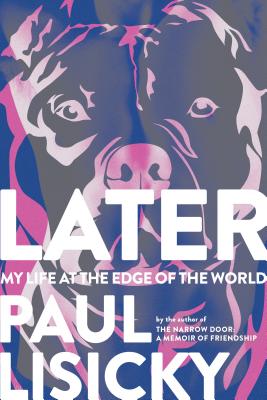 Later: My Life at the Edge of the World
Later: My Life at the Edge of the World
by Paul Lisicky
Graywolf Press. 240 pages, $16.
The memoir begins in 1991, with Lisicky heading to Provincetown to begin a writing fellowship. He’s been living with his mother for the past several months, after finishing graduate school, and is haunted by her sadness and her worries about him: “She is afraid of my living among my own kind, especially now that so many young men are dying of AIDS. She is expecting me to die of AIDS.”
Once he arrives in Provincetown and settles into his new life, we’re thrust into a world full of art, romance, and sexual freedom. He vividly captures the town’s magic. Any reader who’s visited, even for a brief time, will recognize the unique landscape and the vibrancy of its countercultural ethos. But haunting the book on nearly every page is the shadow of AIDS. Provincetown, long a haven for gay people, has become in those years a constant reminder of death. A narrow stretch of land at the end of Cape Cod, it is both literally and figuratively “the edge of the world.”
While many writers take a straightforward approach to memoir writing, with scene-by-scene chronology and reconstructed dialogue, Lisicky writes the way memory actually works—in the present tense, through discrete flashes that bounce against one another, conjuring unexpected associations. Later does not have a conventional plot but instead proceeds through a series of vignettes that together paint an impressionistic picture of life in this very particular place. We find him navigating a difficult love affair, taking odd summer jobs to save up for the doldrums of winter, having sex in the dunes, sitting with a dying friend. Over the course of the book, however, the order behind that apparent randomness becomes clear. Later is ultimately the story of a young man’s growing self-awareness, revealed as much through imagery and reflection as through action. In a devastating moment at a funeral toward the end of the book, past and present come crashing against each other as if to suggest that memory is indeed the only bulwark against loss.
Lisicky takes on a lot in Later, finding thematic resonances among the various aspects of his life—writing, friendships, sex, love affairs—and, of course, Provincetown itself. While the narrative occasionally dwells too long on a particular topic or too little on something the reader craves to know more about, he successfully holds our interest, often using eroticism and humor to counteract the pain at the book’s core. The quirky inhabitants of the town are prominent features of the landscape—the clerk at a head shop who jokes when anyone buys a sex toy, an older gay couple “who look like tiny versions of Popeye.” Even Norman Mailer has a hilarious walk-on. But most of the characters—the ones Lisicky knows best—are presented without fanfare. Even the most famous ones are referred to by only their first names, inviting the reader to share in the sense of intimacy, as if they’re all our friends, too.
Later is as much about a place and a way of being as it is about a period in a specific person’s life. In this elegiac memoir, Lisicky examines the energy, the dreams, and the foibles of this version of himself from a quarter-century ago, and in the process reveals deep truths that resonate beyond his particular story.
At its heart, Later is about finding hope and purpose in dark times. When death is so close, we are all at the edge of the world. And yet, this very danger conjures passion and fills every moment with meaning. A lot of the book is taken up with a kind of sexual awakening, as Lisicky, free from the constraints of his past, embraces his sexuality in the more liberal atmosphere of Provincetown. The book vibrates around the tension of the life force, asserting itself in the shadow of AIDS—sex and death intertwined, as they still are for a generation that became unable to think of one without the other.
____________________________________________________





